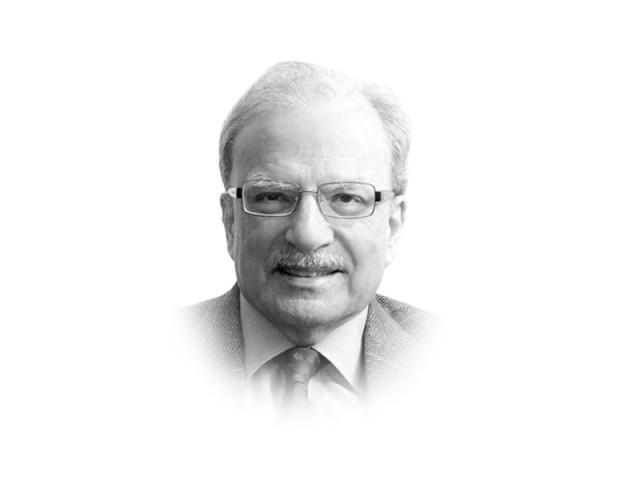Governance and citizen’s discomfort
Political uncertainty need not have produced poor governance. In Pakistan, however, the two came together.

Governance and citizen’s discomfort
There are several measures a well-intentioned government could have adopted to improve the quality of governance. Of these, four are of particular importance: to establish a system of accountability for all public officials in which the citizenry has confidence, to strengthen the legal and judicial systems, to give autonomy to the judiciary and to bring the government closer to the people. There was some movement on two of these four. One of these — autonomy of the judiciary — was forced upon the political system by the civil society. The second — grant of greater authority to the governments at the subnational levels is still work in progress.
Some attempts were made to set up institutions of accountability, most recently, by the administration headed by ex-president Pervez Musharraf. He reorganised the apparatus inherited from the democratic governments that ruled in the 1990s and appointed a highly respected army general — Lieutenant General Muhammad Amjad, in whom he saw all the needed qualities — as its head. The National Accountability Bureau (NAB) was meant to “put the fear of God into the rich and powerful who had been looting the state”, Musharraf wrote later in his autobiography. “A special NAB ordinance was issued to give power and full autonomy to the organisation”, he continued. The NAB worked diligently and hard at the beginning of the Musharraf era. But as had happened so many times before it, too, became politicised.
In an attempt to stay in power, while realising that he could not stop the country from moving towards democracy, president Musharraf struck a deal with Benazir Bhutto and her party, the PPP. As a part of the deal, he issued the National Reconciliation Ordinance (NRO) on October 5, 2007. According to Transparency International “in many ways, this was a set-back for anti-corruption moves in Pakistan, as all proceedings under investigation or pending in any court that had been initiated, or involved the National Accountability Bureau NAB prior to October 12, 1999 were withdrawn and terminated with immediate effect. NRO also granted further protection to parliamentarians as no sitting member of the parliament or provincial assembly can could be arrested without taking into consideration the recommendations of the of the Special Parliamentary Committee on Ethics or the Special Committee of the Provincial Assembly on Ethics.” The NRO became an issue of contention between an assertive judiciary and the PPP-led government. The issue remains unresolved.
Pakistan — in particular its policymakers — have not fully grasped the importance of a well-functioning legal system for providing good governance. No significant attempts have been made since the founding of the country to reform the legal system so that it adequately addresses the varied needs of the citizenry. Dispute settlement and holding accountable those who break the law are two of the more important attributes of a good legal structure. Both attributes not only help the poorer segments of the society. Failure of one or of both hurt the political system and it obstructs the smooth economic development. The legal system’s inability to deliver timely justice is one reason why an increasing number of people in Pakistan are being attracted towards the Islamic way of providing justice.
The problems with the existing system have been investigated a number of times, most recently by the Asian Development Bank (ADB). The well-funded ADB project to reform the legal system did not go very far in addressing the problems that have rendered it dysfunctional. Its failure to fully achieve the stated objectives was the poor by-in by the various governments at the federal as well as the provincial levels. In spite of the pressure exerted by the Bank, there was little establishment interest in making the legal system responsive to the needs of the common man.
A legal system is as effective as the judiciary that administers it. Largely, because of the support by the citizenry through the various civil society organisations, Pakistan’s judiciary at the senior levels has begun to provide comfort to the people. The heavy involvement of the legal community — the ‘black coats’ movement — during the waning days of the Musharraf regime has increased people’s confidence in the Supreme Court and the provincial high courts. The courts operating at these levels have begun to take a deep and increasing interest in the political and bureaucratic systems accountability. The current conflict between the Supreme Court and the PPP-led government in Islamabad is likely to be resolved in favour of the judiciary, notwithstanding, the resolution passed by the National Assembly on January 16, expressing confidence in democracy. An efficient and effective judicial system is an important part of the democratic structure, not separate from it.
There is hope that the reshaping of the structure of government following the passage of the Eighteenth Amendment to the constitution will improve the quality of governance by bringing the state closer to the people. But there is also anxiety that the devolution of so much authority to the provinces could cause disruption in a number of areas. There is a particular concern that unless the process of devolution is managed carefully, it could result in the deterioration of public services to the poorer segments of the population. It is now recognised that bringing the government closer to the people is essential for improving the quality of services provided by the public sector. This objective can be achieved if the process of devolution underway, factors in the lessons that history and experiences have to teach.
Published in The Express Tribune, January 30th, 2012.














COMMENTS
Comments are moderated and generally will be posted if they are on-topic and not abusive.
For more information, please see our Comments FAQ